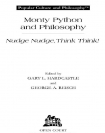Monty Python and Philosophy, Gary Hardcastle [portable ebook reader TXT] 📗

- Author: Gary Hardcastle
Book online «Monty Python and Philosophy, Gary Hardcastle [portable ebook reader TXT] 📗». Author Gary Hardcastle
Transcendental dogmatism is dehumanizing, but so are the opposing extremes of hedonism and nihilistic skepticism. The Buddha made this point explicitly when he argued for a Middle Way between all opposing extremes. Just as one should find a middle way between the slaveries of excessive indulgence and excessive asceticism (self-denial), so too one must avoid embracing both absolutist worldviews (like Palin’s toadying transcendentalist chaplain) and relativist worldviews (where all values and meanings are leveled or negated). The Buddha’s Middle Way doctrine seeks to reclaim human values and meaning by avoiding overly rigid blind faith and also avoiding distracting speculations about matters that are remote from lived experience.
Back Down to Earth
So, what are these more down-to-earth human values that must be rescued from transcendental flights-of-fancy and nihilistic negativity? In light of the film’s critique of transcendentalism, the extremely modest list of values offered at the end as final “answers” to the meaning of life make good sense. They are introduced by Palin (in drag) as he interrupts the Vegas-style celebration of perpetual Christmas. “Well, that’s the end of the film,” she announces. “Now here’s the Meaning of Life.” She opens an envelope and reads, “Well, it’s nothing special. Try and be nice to people, avoid eating fat, read a good book every now and then, get some walking in, and try and live together in peace and harmony with people of all creeds and nations.”
This rather modest sounding list makes perfect sense if we no longer pine for some more grand transcendental meaning. Once we dispatch both the otherworldly values (toadying to God and conserving our sperm, for example) and the otherworldly “realities” which ground those values (soul, heaven, God), then matters of meaning become markedly more pragmatic and demystified. Like Buddha’s philosophy, the essential goals in life become attempts to realize moderation, actualize one’s potential, and reduce suffering. When we try to make issues of ultimate meaning more melodramatic than this, we end up with the distracting and dehumanizing edifices of transcendentalism.
The Buddha offers us Four Noble Truths that can be used to fight these temptations and distractions. First, he says “All life is suffering, or all life is unsatisfactory (dukkha).” This seems pessimistic at first, but he’s simply pointing out that to have a biological body is to be subject to pain, illness, and eventually death. To have family and friends means that we are open to inevitable loss, disappointment, and also betrayal. But more importantly, even when we feel joy and happiness, these too are transient experiences that will fade because all things are impermanent.
Second, the Buddha says “Suffering is caused by craving or attachment.” When we have a pleasurable experience we try to repeat it over and over or try to hang on to it and turn it into a permanent thing. Sensual experiences are not themselves the causes of suffering—they are inherently neutral phenomena. It is the psychological state of craving that rises up in the wake of sensations which causes us to have unrealistic expectations of those feelings—sending us chasing after fleeting experiences that cannot be possessed.
The Third Noble Truth states that the cure for suffering is non-attachment or the cessation of craving. In the Samyutta Nikaya text, the Buddha says that the wise person “regards the delightful and pleasurable things of this world as impermanent, unsatisfactory and without atman (any permanent essence), as a disease and sorrow—it is he who overcomes the craving” (12:66).
And the Fourth Noble Truth is an eight-fold path that helps the follower to steer a Middle Way of ethical moderation. Following the simple eight-fold path, which contains simple recommendations similar those listed at the end of Monty Python’s The Meaning of Life, allows the follower to overcome egoistic craving. Perhaps the most important craving that must be overcome, according to Buddha, is the craving for immortality. The Buddha claimed that giving up transcendental tendencies would help us to better see the people all around us who need our help. We would become more compassionate, he argued, because we would not be distracted by cravings for the “other world.”
Mind the Mindfulness
As the Pythons suggest, however, not all dehumanizing distraction comes from “above.” Often, we lose sight of compassion and humane living by drowning ourselves in a sea of trivial diversions. In existential terms, we lose our “authentic self ” in the unimportant hustle and bustle of everyday matters. Consider again the executives of the Very Big Corporation of America. Later in the film, we learn that just before they were attacked by the mutineers sailing the Crimson Permanent Assurance they were having a meeting about “Item Six on the Agenda, the Meaning of Life.” The board chairman, Graham Chapman, turns things over to Michael Palin: “Now Harry, you’ve had some thoughts on this.” “That’s right, yeah. I’ve had a team working on this over the past few weeks,” Palin explains in his best American accent:
What we’ve come up with can be reduced to two fundamental concepts. One, people are not wearing enough hats. Two, matter is energy; in the Universe there are many energy fields which we cannot normally perceive. Some energies have a spiritual source which act upon a person’s soul. However, this soul does not exist ab initio, as orthodox Christianity teaches; it has to be brought into existence by a process of guided self-observation.





Comments (0)